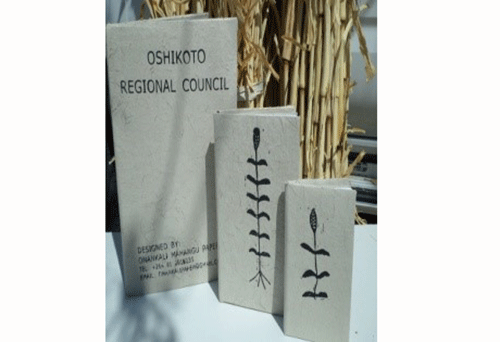Tomas Gabriel
ONANKALI – Abraham Shikongo from Onankali village in the Oshikoto region founded the Onankali Paper Project in 2001 to help sustain his community and develop skills amongst the youth.
Sitting down with Nampa recently to sketch the path of the project, 51-year-old Shikongo said with the help of friends and relatives, he formed the Onankali Mahangu Paper Making Close Corporation (OMPMCC) in 2002, which he registered with the industrialisation and trade ministry under the small and medium enterprise (SME) development.
The OMPMCC manager said all the members of the close corporation have received varied training from the Rössing Foundation and the University of Namibia northern campus to acquire skills in small business development that enable them to co-ordinate the production processes and meet orders.
“OMPMCC produces paper from mahangu stalks. The products include envelopes, photo albums, notebooks, bookmarks, book covers, gift tags, conference folders, wrapping paper, greeting cards and many other stationery products and crafts, which are sold to tourists nationally and internationally,” Shikongo said.
The backbone activity of OMPMCC is addressing environmental and socio-economic problems by recycling used paper and reusing it, he relayed.
“Mahangu stalks reduce littering because the used paper is collected and mixed with the mahangu fibres. Moreover, reusing paper to manufacture paper reduces the cutting down of trees to manufacture more paper,” Shikongo continued.
Shikongo and his team use traditional means to make and process the paper by hand. OMPMCC secretary Jonas Nghihulu said they also plan to manufacture egg cartons and toilet paper from old used paper and old boxes from early next year. Nghihulu said they collect used white paper from offices, schools and other institutions, which means all the paper that would have been dumped is being reused or recycled.
Mahangu stalks, amongst others, from their fields or the two-hectare piece of land they got from the Ondonga Traditional Authority, are used to make the paper.
They received the two hectares of land from the traditional authority last year, where they built a small workshop with an office, toilets, a craft shop, manual paper pulp recycle drummer, hand moulds and decker, as well as a manual squeezing machine.
“We cook mahangu stalk for eight hours straight to soften it, and then mix 50% of the mahangu stalk with 50% recycled paper for a brighter colour,” said Nghihulu.
He said one of the challenges they experience is the lack of modern equipment.
“At the moment, the demand for mahangu paper products is low because the quality of the final product is not of a high standard,” Nghihulu said.
He added that no distributors are eager to display the paper product because it cannot be used for writing or printing, as it absorbs the ink.
“We are, therefore, recommended to improve the quality of the paper through refining and sharing information, as well as getting technical assistance for the paper to become marketable,” Nghihulu added.
He also said despite the fact that the expenses of the project are low, it is running at a loss due to the lack of sustainable income flow.
“Product diversification is the key to unlocking the potential because the current products are small in quantity and value,” he said.
He further noted that the existing products cannot generate income for sustainable business operations and profitability, so they are planning to introduce products of high demand potential, such as egg cartons and boxes, to become commercially viable.
“Packaging is especially important because the demand from the industrial point of view is high,” said Nghihulu.
Nghihulu narrated that in some cases, the project can go on for a full month without making an income.
He said the raw material is available at no cost because the project members collect the mahangu stalks from their fields.
The raw material is abundantly available in the entire Oshikoto, Ohangwena, Oshana, Omusati, as well as the Kavango West and East regions.
Local customer Haihambo Matheus, who buys A6 envelopes from the community projects, expressed appreciation for their hard work and urged Namibians to support SMEs.
“Our people only want to support bigger companies, leaving the smaller ones to die, so please let us come together and help sustain these upcoming businesses,” said Matheus. – Nampa



